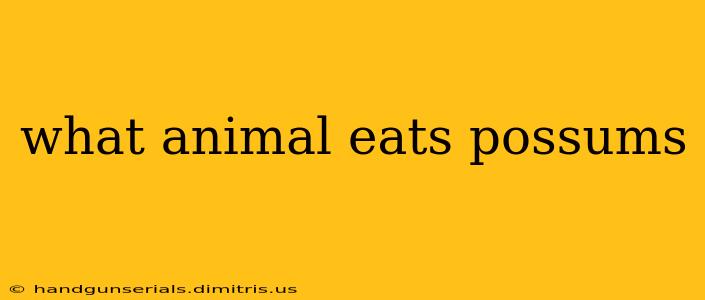Possums, those often-misunderstood marsupials, play a vital role in their ecosystems. But like any animal, they're part of the food chain, and several predators enjoy a possum meal. Understanding their predators offers a glimpse into the complex web of life in their habitats. This article delves into the diverse range of animals that prey on possums, exploring their hunting strategies and the factors influencing predation.
Natural Predators of Possums
The specific predators of possums vary depending on their geographical location and the size of the possum species. Larger possums naturally have different predators than smaller ones. However, some common predators across various regions include:
Large Mammals:
- Coyotes: These highly adaptable canids are opportunistic hunters, readily preying on possums, especially in North America. Their intelligence and hunting skills make them formidable predators.
- Dogs: Domestic dogs, both feral and owned, pose a significant threat to possums. Their size and strength, coupled with their hunting instincts, make them effective possum hunters.
- Bobcats: These skilled hunters are adept at stalking and ambushing their prey, including possums. Their powerful jaws and sharp claws enable them to subdue even relatively large possums.
- Foxes: Similar to coyotes, foxes are opportunistic predators that will readily include possums in their diet when the opportunity arises. Their cunning and agility contribute to their success as hunters.
- Raccoons: While often viewed as cute, raccoons are opportunistic omnivores and will occasionally prey on smaller possums or young.
Birds of Prey:
- Owls: Large owls, such as great horned owls, are powerful predators capable of taking down adult possums. Their exceptional night vision and silent flight make them efficient hunters.
- Hawks: Certain hawk species, particularly those of larger size, might prey on smaller possum species or young.
Reptiles:
- Alligators and Crocodiles (in specific regions): In areas where their habitats overlap, alligators and crocodiles can prey on possums, especially those living near water sources.
Other Predators:
- Large Snakes (in specific regions): Depending on the region and the size of both the snake and the possum, certain snakes may prey on possums.
Factors Influencing Predation
Several factors can influence the success of possum predators:
- Possum Size and Age: Smaller and younger possums are more vulnerable to predation than larger, adult individuals.
- Habitat: The type of habitat significantly impacts predation rates. Possums in dense forests might have more cover from predators than those in open areas.
- Predator Population Density: High predator populations naturally increase the risk for possums.
- Possum Defenses: While not always successful, possums have defense mechanisms, such as playing dead or emitting a foul-smelling odor, that may deter some predators.
Conclusion
The array of animals that prey on possums highlights their place in the ecosystem's intricate food web. While possums possess certain defenses, they remain vulnerable to a range of predators, influencing their populations and behavior. Understanding these predatory relationships is crucial for comprehending the dynamics of wildlife populations and their conservation.

